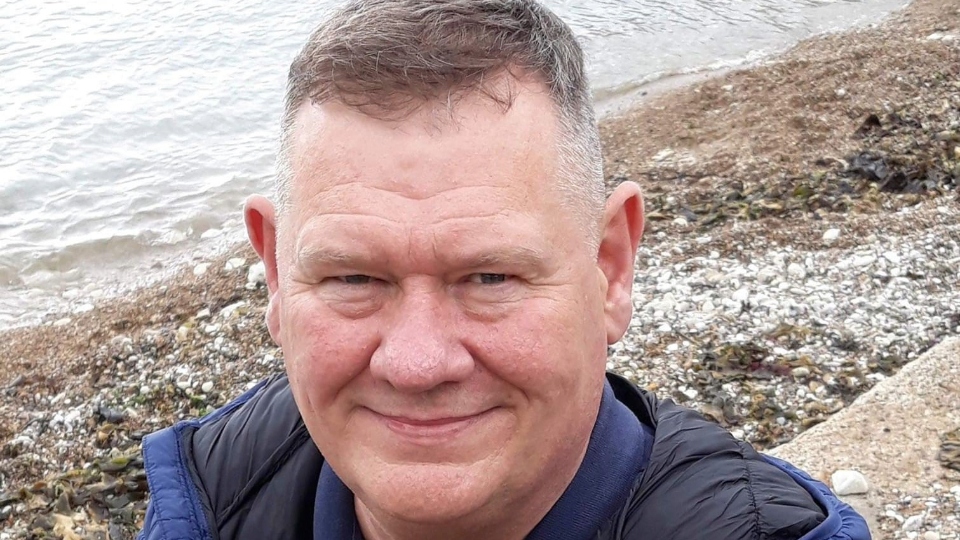Men get breast cancer too - It’s important to know the signs
Date published: 11 June 2025

Oldham dad David McCallion
An Oldham dad living with incurable breast cancer is urging men to be aware of the symptoms, this Men’s Health Week.
David McCallion, who is 55 and from Moorside, wants to raise awareness among men after his own unexpected diagnosis.
The father-of-two had visited his GP for an unrelated issue in 2019 when, at the end of the appointment, the doctor asked if there was anything else bothering him.
David mentioned noticing an inverted nipple - an offhand comment that led to a life-changing discovery.
He said: “I noticed my nipple had become inverted.
"I left it for a week or two and then happened to be at the doctor’s surgery about something else.
"At the end, we started talking about it.
"The GP called me back in and the next thing I knew, I was being referred to hospital for tests.”
David had previously been diagnosed with gynecomastia - a non-cancerous swelling of breast tissue - on the other side of his chest and assumed this might be something similar.
But tests at Manchester Royal Infirmary revealed it was breast cancer: grade two ductal carcinoma, which had already spread to his surrounding lymph nodes, meaning it was now stage 3.
He underwent chemotherapy and radiotherapy, and initially the treatment was successful.
But then in 2023, David developed a persistent cough, with increased breathlessness.
Initially, he thought it was COVID-19, but when it wouldn’t go away, further tests revealed the cancer had spread to his lungs.
His condition is now considered incurable.
David said: “My cancer is being kept stable with targeted treatment.
"I just hope the drugs keep working - and if they stop, that there are others available.
"Treatments are improving all the time, so I’m focusing on living with cancer.
“If I can help other men go to their doctor sooner, then that’s something I want to do.
"Many still don’t realise men can get breast cancer.
"I want to spread the message far and wide.
"Men are often bad at going to the GP, but I’d say: don’t worry about missing an hour’s overtime - think about saving your life.”
David’s story comes ahead of Men’s Health Week (June 9–15), which leads up to Father’s Day and aims to spotlight the about the health challenges men face and encourage them to prioritise their well-being.
Breast cancer in men is rare, but it does happen.
Around 390 men are diagnosed each year in the UK, compared with around 56,800 women - meaning fewer than 1 in 100 breast cancer cases occur in men.
Miss Clare Garnsey, Clinical Lead for Breast Cancer at Greater Manchester Cancer Alliance, part of the NHS in Greater Manchester, said: “Although breast cancer is more common in women, it’s important that men also understand the symptoms and regularly check their chest for any changes.
"If you notice something unusual, such as a new lump in the chest or armpit area, a change in the nipple shape or liquid leaking from your nipple, see your GP.
"It’s likely to be nothing serious, but if it is cancer, catching it early makes a big difference.”
Common symptoms of male breast cancer include:
a lump in the nipple, chest or armpit area
nipple discharge
the nipple pulling inward
a sore or ulcer on the skin of the nipple or chest area
a rash on or around the nipple
David later discovered he carries the BRCA gene on his father’s side of the family - a genetic mutation that increases the risk of certain cancers.
He said: “My diagnosis meant my sons could get tested. One of them carries the gene.
"It was a tough moment, but now he’ll be able to get regular checks.
"It’s not just about your health - it’s about protecting your family’s future too.”
For more information on breast cancer symptoms and support, visit the NHS website.
Supporting patients with incurable cancer, also known as metastatic cancer, to live as long and as healthy lives as possible is very important to the cancer team working at the Greater Manchester Cancer Alliance.
The alliance has recently developed a Greater Manchester Metastatic Cancer Strategy to improve care for individuals living with metastatic disease.
One in two of us will be treated for cancer in our lifetimes and as treatments continue to improve, more people will live with metastatic disease for longer, so we have to make metastatic healthcare a priority.
This includes educating previous cancer patients and healthcare workers on the signs and symptoms of metastatic disease, developing timely diagnostic pathways so that individuals with symptoms of cancer spread can be diagnosed and treated very quickly and making sure we support individuals living with incurable cancer, not just physically, but emotionally, socially, financially and spiritually.
For more information on health and wellbeing support closer to home, please click here
Do you have a story for us? Want to tell us about something going on in and around Oldham? Let us know by emailing news@oldham-chronicle.co.uk , calling our Oldham-based newsroom on 0161 633 2121 , tweeting us @oldhamchronicle or messaging us through our Facebook page. All contact will be treated in confidence.




